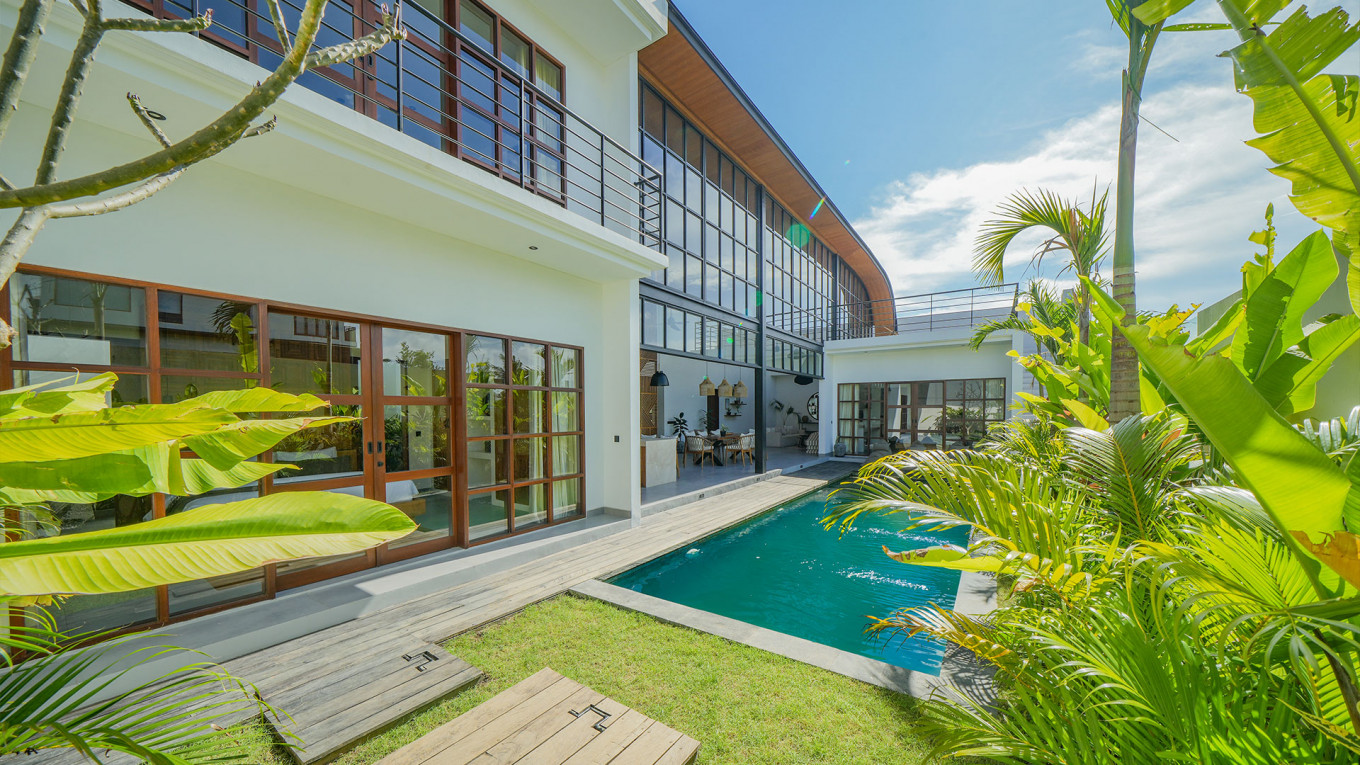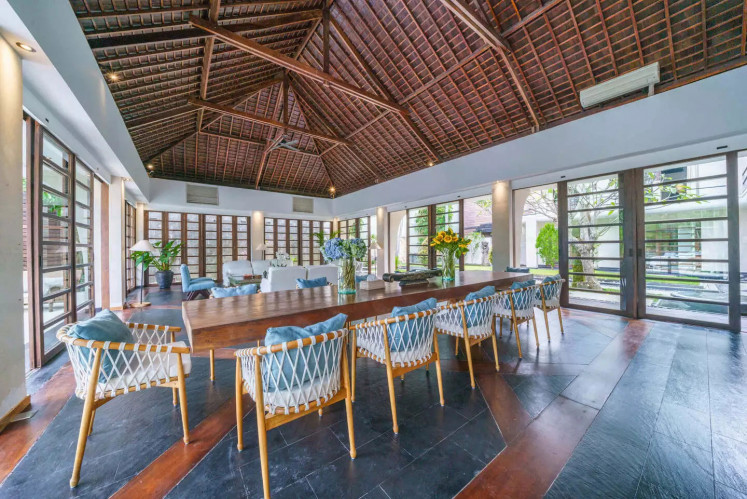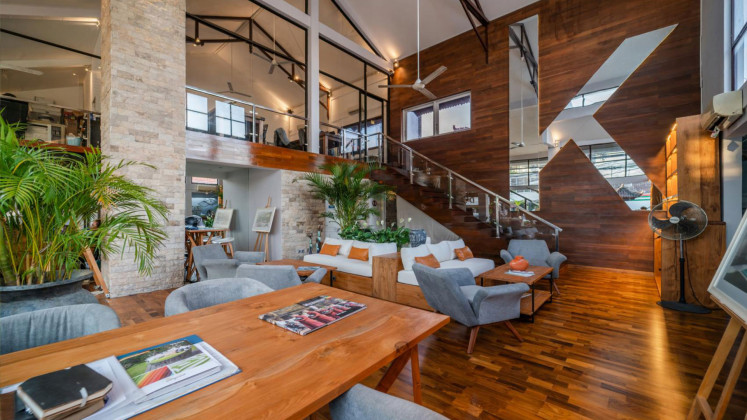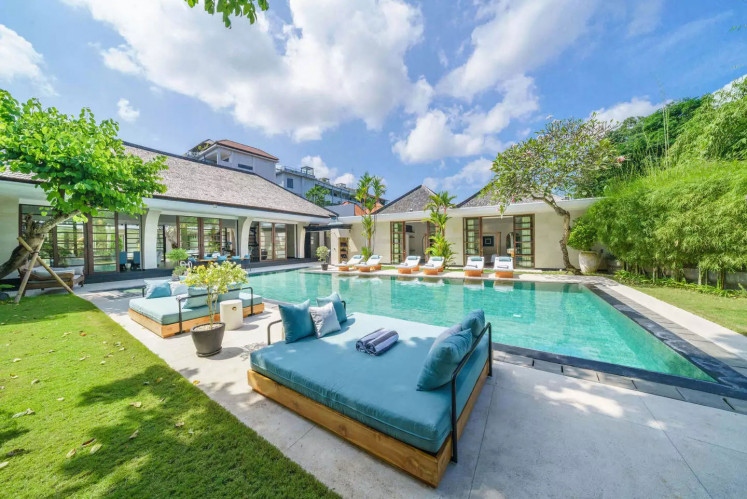(Courtesy of K-Club Cemagi)
Picture this: An idyllic pool villa on the Island of the Gods that you can enjoy whenever you’re on holiday, which earns thousands of dollars for you when you’re not using it. Does it sound too good to be true?
As a resident of Bali for nearly seven years, I have had friends from all over the world ask me about the realities of moving to the island or buying or leasing property as a form of investment.
Recently, one of my friends forwarded me an Instagram link to a real estate company advertising villas in Bali for long-term lease, or leasehold, ranging from 25 to 29 years. On the ads were images of this modern-style architecture with white walls, black steel window frames, swimming pool with cool blue tiles, adorned by lush tropical plants.
Each of the images was captioned with projected returns on investment (ROI) reaching nearly 16 percent. Another link she sent me was of a developer company promising potential investors an occupancy rate above 85 percent for the villas they are building.
Are these numbers realistic?
‘It depends’

Thank you!
For signing up to our newsletter.
Please check your email for your newsletter subscription.
The answer, according to property agents I spoke to, is it depends.
Occupancy rates above 75 to 85 percent for villas on long-term lease, or “leasehold”, in Bali are realistic, depending on the area it is in, according to a sales manager at Kibarer Property, a well-known property company established in 2009 that also provides legal services, in Kerobokan, Bali.
“Good tourism areas will bring good rentals and occupancies, especially on the sunset side,” he said, citing Canggu, Seminyak and Uluwatu along the Western coast of the island as great tourism areas. He asked not to be named so he could speak candidly.
“So depending on the areas, people are getting ROIs of between 8 to 12 or even 13 percent very comfortably based on good occupancy rates of about 80 to 85 percent.”
However, there is not a lot of hard data to back this up, according to Terje Nilsen, the cofounder of Seven Stones Indonesia, a company that offers legal advice and market-entry services, including helping potential investors find properties in Bali and beyond.
“Because there is no track record other than stories that agents tell,” he said. “So agents will probably only tell you stories that it’s a great market, but there is no tangible data in any shape or form.”
He explained that when people buy a freehold villa or land, which means permanent ownership, they tend to under-report the value to save on taxes.
“If it's a lease, which now is probably 75 to 80 percent of the market, the same thing happens. They tend to under-report maybe at best 50 percent of the real value of the transaction,” he said.
This would then affect the calculation of ROI.
“There are lots of stories about how some people have seen advertisements claiming 43 percent ROI, which to me is impossible,” he said. “And if you did this abroad, you'd be prosecuted, because you can't make promises like that.”
An average good ROI in Bali, he said, would be 8 to 12 percent.
“But again, it's very difficult to find accurate data,” he said.
(Courtesy of Villa Karishma)
Read also: Chasing the island dream
The Bali draw
Despite the lack of accurate data, properties in Bali are still seen as good investments.
“[The prices are] still cheaper than what [foreigners] can get in their own country and the ROI is better,” the Kibarer consultant said. “You can get more than 10 or even 12 percent here, while in their country, let’s say in France, [the ROI] is less than 4 percent.”
The value of land also keeps going up, he added.
“During the COVID-19 pandemic, land prices were stable and didn’t drop. After the pandemic, a lot of foreigners, mostly Russians, came with a lot of cash and all the land prices increased by 12 percent a year,” he said. “And it’s still going up.”
Over the past couple of years, I have noticed an increasing number of development projects in the southern areas of Bali, particularly in Uluwatu, Pecatu and Nusa Dua where I reside. The prices of land, both for leasehold and freehold, are skyrocketing. The closer the location to the beach, the more expensive it is per ara (100 square meters).
But beyond the numbers, Terje said investing in Bali is very often a combination between an emotional lifestyle investment and money.
“In the end, the lifestyle value to it seems to dominate, so they tend to forget or be less diligent with figures,” he said.
Reality then kicks in once investors start operating the villa as a rental.
“You'll hire some kind of management company who right away will take 20 percent [of gross revenues], and that's after Airbnb or booking.com or whichever [platform] takes 15 to 17 percent. So already you're 37 percent down before your operational costs, utilities, labor and so on.”
(Courtesy of Kibarer Property)
Read also: Between the shores and the sea of Belitung
Investment waves
With properties selling like hot cakes these days, I cannot overlook the fact that there are abandoned development projects around the Island.
Terje told me that Bali has seen “waves like this before.”
“For instance, now the market has an awful lot of ‘off-plans’ that did not get completed, and that happened probably back in 2010 to 2012 when there were a lot of projects running into trouble financially,” he said.
Off-plan refers to properties that are sold before they are completed. This makes them cheaper than completed villas, but they come with the risk that the developer or contractor would not finish them. Terje said there are cases where the contractor fails to manage the cash flow and goes bankrupt, or just picks up and leaves.
“There’s an awful lot of problems,” he said. “The end buyer is not getting what they are supposed to get.”
That is why, the most important thing to do before investing in Bali is to “always do your homework.”
This means having due diligence done to check all the legalities of the property, the accuracy of tax reports and so on before any transaction to avoid any losses.
Otherwise, your picturesque holiday investment might turn out to be a nightmare.
(Courtesy of Villa Karishma)
Top tips before investing in a property in Bali:
- Verify the legal ownership of the property and insist on seeing the authentic certificate.
- Confirm that the property is built in compliance with local zoning regulations.
- Check for any legal disputes, tax delinquencies and any liabilities.
- Make sure you have the right to access the roads around the property.
- Use your own notary/lawyer and not the developer’s or property owner’s.
- Choose a trustworthy company to assist you with legal matters and do your due diligence.
Read also: Dance and delight: Shaping Commune-sense at Krapela
This article is part of The Weekender, a biweekly tabloid that appears in the Saturday edition of The Jakarta Post. Offering a variety of feature articles on lifestyle and culture, it aims to enriching your reading experience. Subscribe here to access The Jakarta Post's Saturday edition and all Premium content.

























